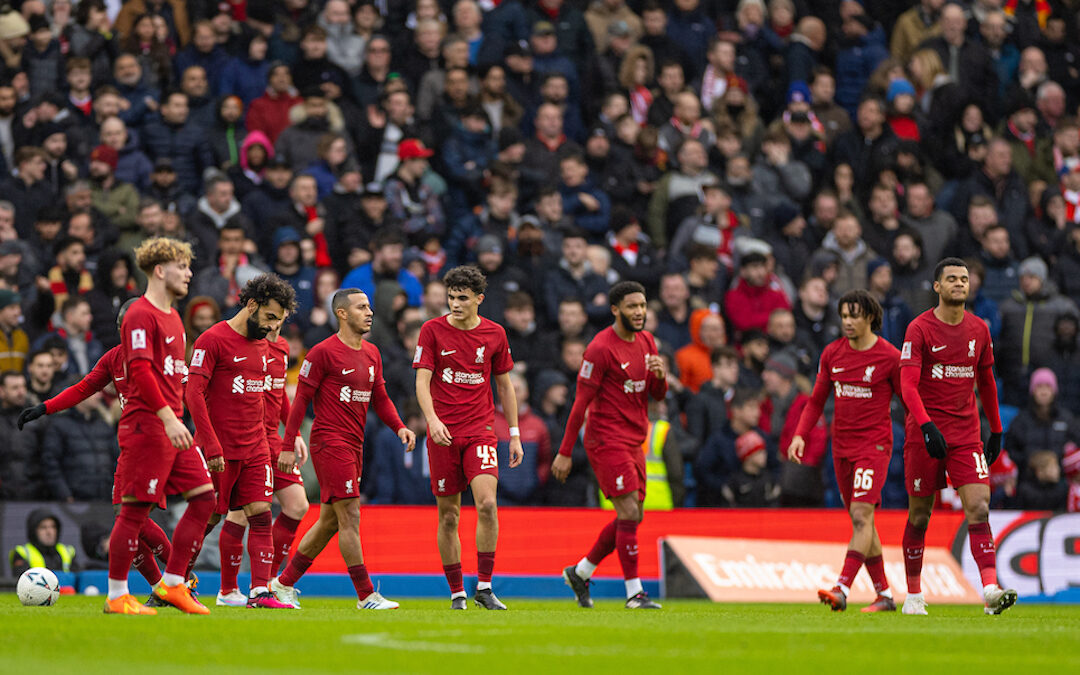Liverpool’s Jekyll and Hyde performances this season have caused fans to search for answers, but how much of it lies in the players’ mindset?
IMAGINE for a few minutes that you’re the owner of a Formula One racing team.
Picture the money you spend each month on a team of engineers, managers, assistants and drivers.
Now think about the car itself. A multi-million pound asset in its own regard. A complicated combination of metal, electronics, gears, a super-engine, the most expensive tyres on the planet and a state of the art on-board computer system that runs everything.
In order to create a winning team in a highly competitive industry, you have to look at every little detail that might get you the fraction of a second advantage you need to win.
You pay the best mechanics in the world as much money as you can to create an engine that has as much power as possible.
You focus night and day on aerodynamics and how quickly you can change those costly tyres during a pit-stop.
You hire the best driver you can possibly find.
But imagine now if I told you that while focusing all of this attention on the physical parts of the enterprise, you almost entirely disregard the sophisticated on-board computer system in the car that ties everything else together.
Whenever there’s an issue with the engine that can’t be explained through any investigation of the machine itself, you just shrug your shoulders and say: “Well, we’ll just keep getting the driver to press the accelerator as hard as he can and hope for the best.”
Wouldn’t that be a crazy approach to take?
If that was you, wouldn’t you invest just as much in the computer system that tells the engine and the brakes what to do as you invest in the hardware?
Wouldn’t that make logical sense?
Yet when it comes to talking about elite-level footballers, this is exactly the approach that is taken even at the highest levels of the game.
Jürgen Klopp was asked in the press conference before the recent Crystal Palace game what the emotional state of the Liverpool players was like. How was their mood?
His response was to say we can’t know the mood of other people. He tells the players how he feels but doesn’t ask them individually how they are feeling.
Note that at the same time as this, the physical condition of the players is constantly under review, with various forms of tests to check their fitness levels and condition. Each player has a personalised nutrition plan.
Jürgen went on to say that the players aren’t kids anymore. They know how to deal with setbacks.
To me this is akin to looking back 50 years to when footballers commonly drank alcohol and ate fish, chips and pizzas as their post-match meals and, when faced with a question at a press conference about the players looking a bit overweight or slow during games, the manager telling reporters that the players knew what they needed to eat to look after themselves.
That was the standard practice until managers like Arsene Wenger brought a more modern approach to diet and nutrition to the Premier League, completely changing the landscape of how footballers needed to prepare physically in order to be at their best.
It is inconceivable now that the most elite footballers would eat poor diets and expect to perform at their peak level, yet great managers and players in previous eras had limited knowledge of the impact diet and nutrition could have on performance so completely ignored it apart from the odd instruction to eat lots of steak.
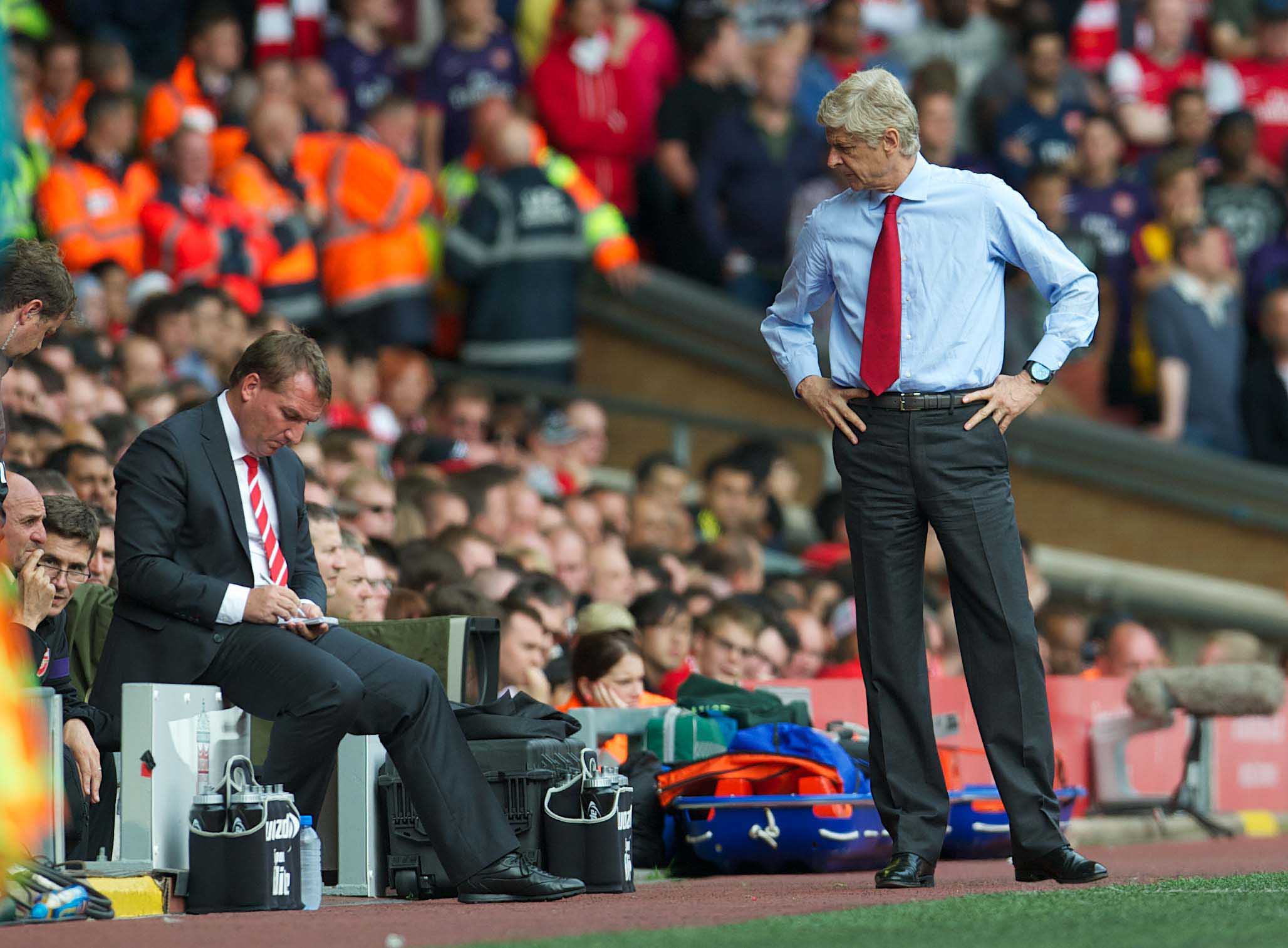
That isn’t a criticism of the greats like Bill Shankly and Bob Paisley, in the same way this isn’t a criticism of the current great managers or the pundits across various TV channels who repeatedly say they have no way to explain why footballers who were once amazing can suddenly look shadows of their former selves, sometimes with the transformations coming within one match.
Every industry tends to operate with blind spots within the parameters set by previous generations, until someone comes along and moves the goalposts by introducing something new that changes everything.
I believe in 10 to 20 years’ time we will look back at the way elite sports people approach their psychological and emotional health today in the same way we look back now in disbelief that top sports stars once smoked cigarettes.
The reality is that the psychological and emotional health of us all is crucial to how well we are able to perform in any task, physical or otherwise.
Our brains and emotional systems are the equivalent of the complex onboard computers in the Formula One cars I described earlier. If the computer system is faulty or damaged in some way, it has a direct impact on the way the rest of the machine functions.
People often discuss confidence in this context, as I once did, and use it as some form of mythical elixir that can fix all problems, if only we knew how to generate it.
What I have discovered following years of studying human behaviour, psychology and emotions, though, is that confidence is only the surface level issue. It’s why, following two wins against tricky opposition, Liverpool’s players were still fragile going into their game against Real Madrid rather than being back to their self-assured best.
If you believe that the magic ingredient to a footballer’s performance is confidence, it’s worth questioning why Manchester United’s players crumbled at 2-0 down at Anfield when they had come into the game as confident as they could possibly be having won their first trophy in several years only a week before, and being talked about as possible quadruple winners.
Or why, a week after their confidence-boosting demolition of that same United team, Liverpool’s players were back to the versions of themselves that seems to leave everyone dumbfounded.
The reality is that surface level confidence is not the answer we thought it once was. What’s going on under the surface is the true root cause of all of the problems the players are facing.

We’ve seen it with Liverpool players in recent weeks, and the clearest example of it might be Bruno Fernandes in the 7-0 demolition of Manchester United.
The reason it looks like a different player is that it is a different player. Or, more accurately, a different part, character or persona of the same player we’ve watched perform at the highest level for weeks, months or years.
The problem is that all of these characters inhabit the same physical body, so to the outside world it looks like the same person when the reality is someone new is in control. The player doesn’t actually lose their head, but they do have someone else inhabit their head without them realising or wanting it to happen.
You might ask why this seemed to only happen to many of Liverpool’s players this season, whereas in previous seasons they’ve been able to bounce back from adversity much sooner, or why players in another team who were previously highly confident can just suddenly crumble while their self-pity or victim character takes over their body.
It’s a good question.
Collapses in one-off games can be explained by a sudden, unexpected traumatic event such as going three goals down to an opponent you expect to beat, triggering a subconscious character to take control of a player’s system as it goes into survival mode.
It amazes me that people have talked about the likes of Fabinho as though he was a spent force, before realising he’s only 29 years old and Luka Modric is still running midfields at 37.
I would guess that if you put the likes of Fabinho, Jordan Henderson, Joel Matip and Virgil Van Dijk through physical fitness tests they would show that there isn’t any physical problem. They can physically run as far and as fast as they ever could.
The same would probably apply to Marcus Rashford if you compared his physical condition last season to this.
The problem with an underperforming player often isn’t in their physical bodies, it’s in their onboard computer systems.
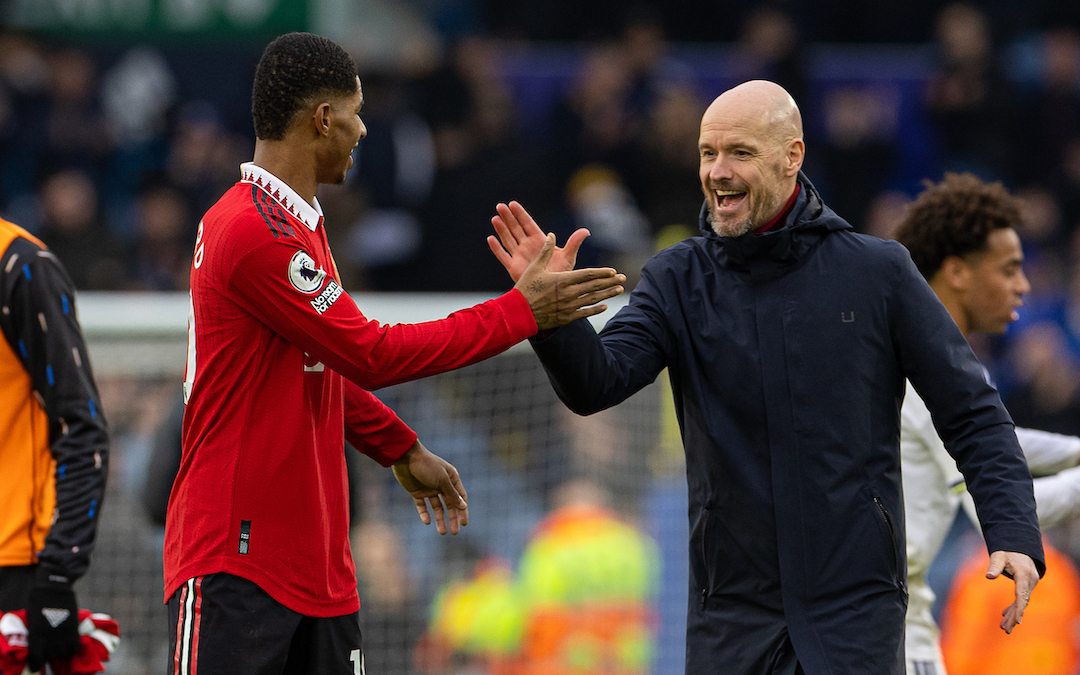
It was interesting to watch an interview with our captain a week or so ago in which he described how Jurgen got all of the players to put the defeats in early cup finals behind them by focusing on the fact that it was just the start of their journey.
On the face of things it’s a powerful psychological tool being used by the manager to encourage the players to focus on the future and the positives to have come from their experiences.
Whether Jurgen is aware or not, his techniques are similar to those used in Neuro Linguistic Programming (NLP), which help people to reframe their experiences to make them positive rather than negative.
As a qualified NLP practitioner I used to be a big fan of those ideas, and there is still value in them, however, what I’ve learnt in the past few years is that by constantly encouraging humans to reframe difficult or challenging experiences into positive life events, we take away from them the opportunity to properly process the emotions they experienced during the event.
We effectively continue the pattern of emotional repression and suppression that we’ve been taught since we were young children and, at some point, those repressed emotions manifest in our lives in ways that damage us.
It’s like a bucket that slowly fills up over time and, once it gets to the top, it overflows and all hell breaks loose.
If you’re one of those people who think because a human is paid a lot of money they shouldn’t experience things like emotions, I appreciate you won’t like or agree with any of this.
But if you’re willing to open yourself to the idea that regardless of how much footballers get paid they still feel all the same things as the rest of us, and have the same flaws in their operating systems, we can consider solutions to the problems rather than shrugging our shoulders and saying there’s no explanation, or just saying the players need to try harder or pull their socks up.
So, if this is all true, what is the solution?
There are a couple of answers to that, one is short term the other more medium to long term.
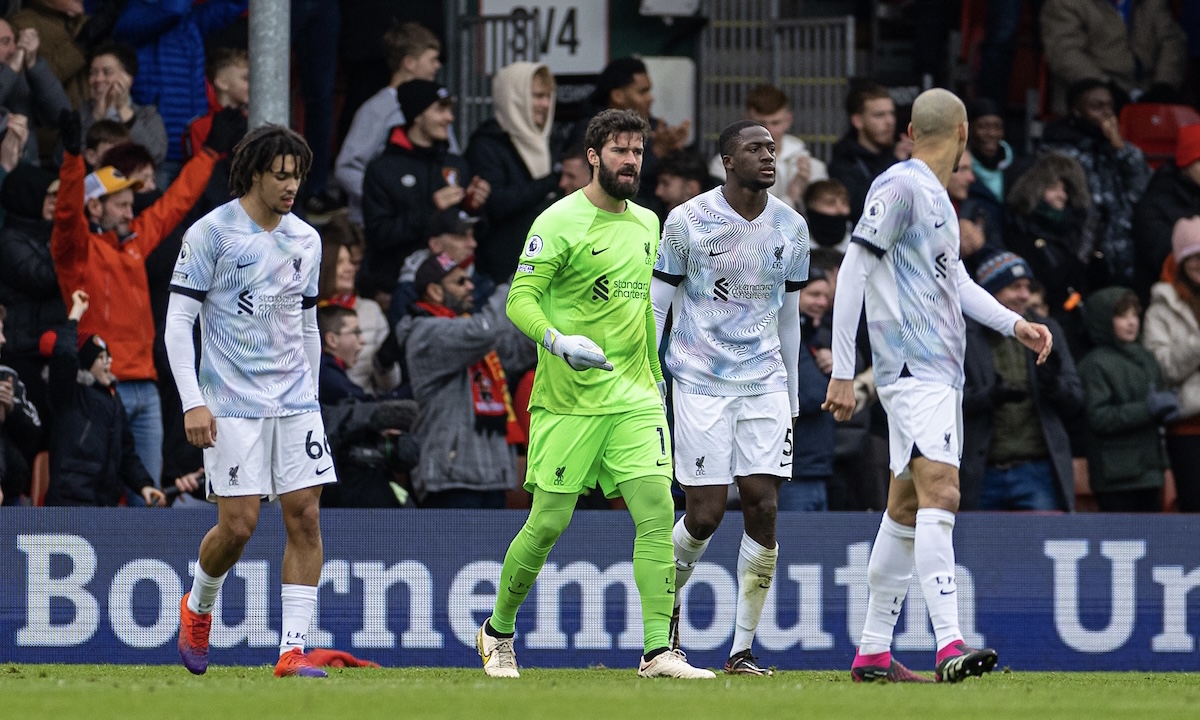
The short term answer is to allow and help the players to fully process all of the experiences they’ve had in recent times that haven’t been dealt with and are weighing them down internally.
For an elite footballer, being on the brink of becoming part of one of the greatest teams, if not the greatest team, of all time by winning every trophy available in one season then falling short at the final hurdles is an emotionally traumatic event.
And the trauma of last season came at the end of an incredibly traumatic few years in which they were physically and emotionally drained through various league and cup campaigns, while also having to deal with the Covid lockdown experience like the rest of us.
You might be screaming at the page right now that losing games of football or missing out on a cup or two isn’t emotionally traumatic, which is what I probably thought before learning about how trauma really works.
The most simple explanation I can give is that when we hear the word ‘trauma’, most of us think of what might be described as capital ‘T’ trauma.
What I see in the current Liverpool squad is a group of humans who have been through varying forms of small ‘t’ trauma over an extended period of time, some of who have been struggling because they haven’t been given the tools to process those highly emotional events properly, and are therefore carrying them around in their onboard computer systems which has had an adverse knock-on effect.
You might wonder why the club having an in-house psychologist hasn’t stopped this problem from surfacing, and there are a few possible explanations for that.
The first is that, having spoken to therapists and psychologists who work in the sporting world, it is not compulsory for players to utilise their services. That generally leads to only a small number of any squad ever utilising the services of someone who might be able to help them.
Imagine if it was optional for the players to follow the diet and nutrition plans carefully created for them by in-house specialists.
The second is that, when a therapist or psychologist is hired by the employer, employees will often not fully trust that what they tell the psychologist won’t somehow make it back to their boss and have a negative impact on their position, which undermines the entire process.
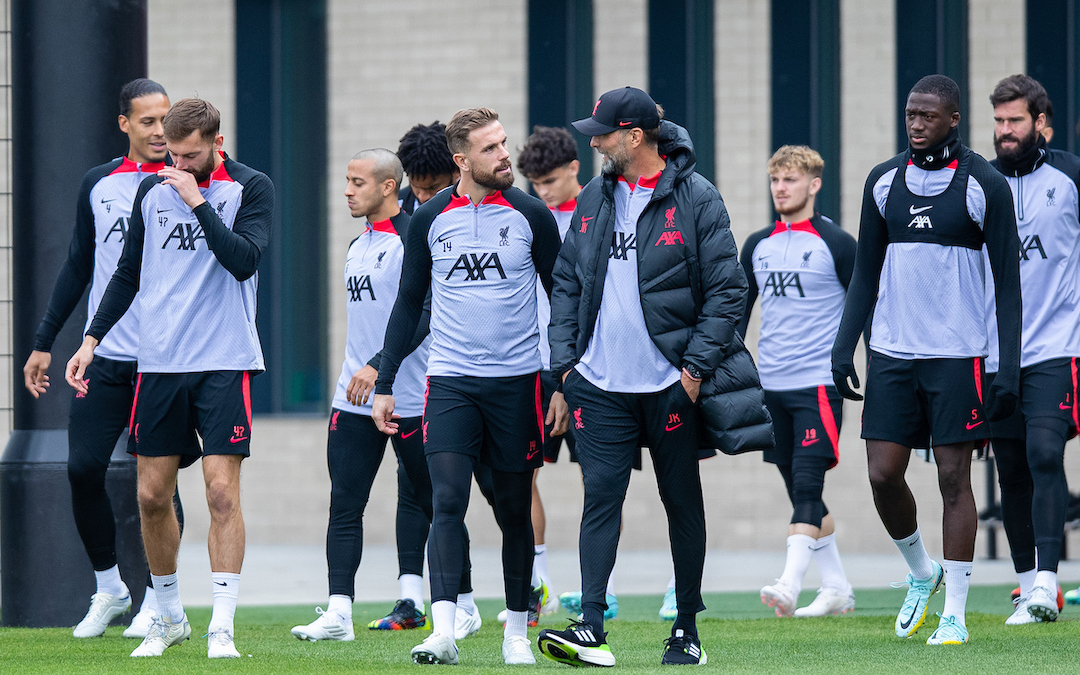
And the third is that, as I mentioned earlier with NLP techniques, often therapists or psychologists will focus only on the immediate term and help people to reframe what has happened to them rather than dealing with the root cause of the problems, which go much deeper.
The third point explains why we do sometimes see sudden upturns in performance, like we have with the game against United.
NLP techniques can be very powerful as short-term solutions, and players can suddenly feel much better on a surface level. The problem is the underlying emotional issues still remain, which leaves players and teams susceptible to an unexpected event triggering an old trauma response that leads to a collapse in performance that is seemingly unexplainable.
The reality, though, is that the Jekyll and Hyde patterns that we’ve seen in recent weeks and months are far from being without explanation, it’s just that elite football and, for that matter, most elite sports, have not to this point embraced how much psychological and emotional health has an impact on performance.
In my view the key, then, is for the players themselves to start to treat their psychological and emotional health with the same care and attention that they treat their physical well-being, rather than waiting on the entire industry to change.
After working with former Liverpool player Stephen Warnock to help him to overcome depression after retirement, which you can hear him talk about here, I asked him whether he thought doing work on his psychological and emotional health while he was still playing would have helped his career.
He said undoubtedly it would have, because it would have allowed him to properly process the things that were hampering him every day and, in turn, get the most out of himself.
It’s also important to reiterate that the full explanation of what I’ve summarised is far more complex and involves more moving parts than I’ve described, and this also isn’t the only explanation for what is happening, it’s just a part of it.
In the same way that to run a Formula One car to its peak capacity you need to have all of its constituent parts firing on all cylinders, for a footballer to operate at their best they need to make sure they’re addressing all of their physical, emotional and psychological needs.
You can read Paul’s piece in full and see more of his work here.

